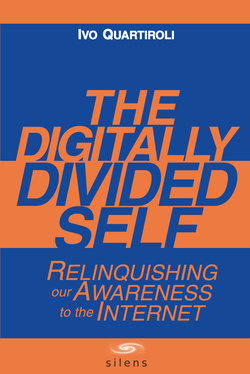Читать книгу The Digitally Divided Self: Relinquishing our Awareness to the Internet - Ivo Ph.D. Quartiroli - Страница 18
На сайте Литреса книга снята с продажи.
The Fragility of Beliefs and Information Technology
ОглавлениеScience cannot conceive anything beyond the ego and the mind – not even in human sciences such as psychology (with the exception of transpersonal psychology). Thus, abandoning our mind’s contents seems like total defeat. In the West, nihilism is often knocking at the door, since what the mind creates – by its ephemeral nature – the mind itself can destroy. Without acknowledging a spiritual dimension, one is tempted to say that there’s nothing solid – and ultimately that there’s no sense in anything.
A culture which has been developed on the foundation of “I think, therefore I am” will cling to thinking and will produce tools to keep the mind busy all the time. But for the spiritually-oriented person there’s a plan B. The abandonment of the ego-mind is equivalent to the metamorphosis of a caterpillar into a butterfly.
The ephemeral nature of the mind becomes clear when, in meditation, we try with titanic effort to observe our thoughts and sensations, instead of clinging to them as they carry our mind away. We can see then how weak our skills are to concentrate on a single object, how short-lived our thoughts are, and how little control we have over them. The mind has been compared by spiritual teachers to a drunken monkey. Yet we cherish our thinking process as the highest expression of being human.
Technology and information are also quite ephemeral. The chances of preserving their digital contents are dim compared to other media. Papyrus lasted thousands of years, books hundreds of years, CDs (the very best quality) dozens of years, and hard drives only a few years.
The software I wrote when I was at university was backed up on magnetic data tape. I don’t know if there’s any compatible tape reader still tucked away in some laboratory. Even if there were, most probably the tape would have been demagnetized by now. But even if not, the software will have been rewritten to work with current operating systems.
In recovering data which is just a few years old, there are both hardware and software format problems. Converting our data to ever-changing computer formats is a huge job – which most probably will never be done either by individuals or institutions. Even if it were, who could make sense of that huge amount of data?
Technology is fragile in other aspects too. As shown by Low-Tech Magazine, the energy consumption of hi-tech devices is skyrocketing, especially the energy required to manufacture them. “The embodied energy of the memory chip of a computer alone already exceeds the energy consumption of the laptop during its life expectancy of 3 years” (deDecker, 2009). Digital technology then, like many other developments since we started to drill for oil, is a product of cheap energy. With the growing cost of energy and a lurking peak in oil production, we won’t see as many hi-tech devices around as we are used to. Also, many hi-tech products depend on rare earth metals, more than 95 percent of which are found in China – which plans to limit exports.
Hi-tech products are also very sensitive to the electromagnetic radiation of solar wind. The current 11-year solar cycle, which started in 2007 and will peak around 2013, should be significantly stronger than the previous one. Solar flares shoot energetic photons toward Earth, upsetting the geomagnetic field and potentially affecting power grids, communications, satellites, GPS signals and even electronic chips.
A strong solar storm in 1859 shorted telegraph wires, causing fires in North America and Europe. If such an electromagnetic storm occurred today, it would take four to ten years to recover electric power lines, according to a report of the National Academy of Science. Given the strong interdependence of every system, the effects could be devastating for the whole of society.
As with meditation techniques, in which we learn to observe and let go of arising thoughts, maybe we should begin to practice letting go of our attachments to the information loop.
